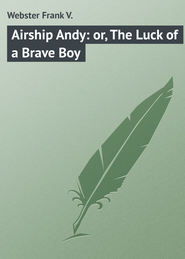По всем вопросам обращайтесь на: info@litportal.ru
(©) 2003-2024.
✖
The Boy Pilot of the Lakes: or, Nat Morton's Perils
Настройки чтения
Размер шрифта
Высота строк
Поля
"I'll give you a hand," said the pilot. "Mr. Simmon, my helper, is in the pilot-house," he went on, in answer to a questioning glance from Captain Marshall. "The ship is on a straight course now, and we'll hold it for an hour or two. Now, Nat, come on, and we'll see if we can't solve this puzzle."
It did not take long to demonstrate that Nat was right, and the mate wrong. The ten boxes were found in the afterhold, where they had been put by mistake, which accounted for the mate not being able to find them.
"What have you to say now?" asked the pilot of Mr. Bumstead, when the search was so successfully ended.
"What have I to say? Nothing, except that I think you did a mean thing when you got this boy in here, and kept my nephew out of the place, which he needs so much. But I'll get even with him yet for coming here." It appeared the mate's protest to Captain Marshall, about employing Nat, had been of no effect.
"I guess Nat needed a place to work as much as did your nephew," replied Mr. Weatherby, when his protégé had gone back to the purser's cabin. "His father is dead, and you ought to be glad that the orphan son of an old lake sailor has a chance to earn his living, instead of making it hard for him."
"Was his father a lake sailor?" asked the mate quickly.
"Yes. Nat's father was James Morton, who was employed on a lumber barge."
"James Morton! On a lumber barge!" exclaimed the mate, turning pale. "Are you sure of that?"
"Certainly. But what of it? Did you know Mr. Morton?"
"Jim Morton," murmured the mate. "I might have recognized the name. So his son is aboard this vessel! I must do something, or – "
"What was that you said?" asked the pilot, who had not caught the mate's words.
"Nothing – I – er – I thought I used to know his father – but – but it must be another man."
The mate was clearly very much excited over something.
"Now look here!" exclaimed Mr. Weatherby sternly. "Nat is not to blame for coming here. I got him the place, and I'll look out for him, too. If you try any of your tricks I'll take a hand in the game myself. Now, I've given you your course, and I want you to keep on it. If you run afoul of me you'll be sorry for it."
The mate turned aside, muttering to himself, but the pilot thought it was because he had made a mistake about the boxes.
"Look out for him, Nat," said Mr. Weatherby, a little later, after the pilot had reported to the captain the result of the search for the missing boxes. "He seems to have some grudge against you, and he'll do you an injury if he can."
"I believe that," replied Nat, "though I can't see why he should. I never injured him, and it was not my fault that I got the place he wanted for his nephew."
"No, of course not. But keep your weather eye open."
"I will."
Captain Marshall showed no very great pleasure at finding that Nat was in the right. The truth was he feared the mate would be chagrined over the mistake he himself had made, and Captain Marshall was the least bit afraid of Mr. Bumstead, for the commander knew the mate was aware of certain shortcomings in regard to the management of the vessel, and he feared his chief officer might disclose them.
"You want to be careful of your lists," the commander said to Nat. "You were right this time, but next time you might be wrong."
Nat's pleasure at finding he had not made a mistake was a little dampened by the cool way in which the captain took it, but Mr. Weatherby told him not to mind, but to do his work as well as he could, and he would get along all right.
For two or three days after that the voyage proceeded quietly. On the third day the ship stopped at a small city, where part of the cargo was discharged. Nat and the purser were kept busy checking off, and verifying cargo lists, and, when the Jessie Drew was ready to proceed, Nat took to the mate a duplicate list of what cargo had been discharged.
"Sure this is right?" asked Mr. Bumstead surlily.
"Yes, sir," replied Nat, more pleasantly than he felt.
"Don't be too sure, young man. I'll catch you in a mistake yet, and when I do – well, look out – that's all."
He tossed the list on his desk, and, as he did so, some papers slipped to the floor of his office. He stooped to pick them up, and something dropped from his pocket.
It was a flat leather book, such as is used by some men in which to carry their money or papers. Nat idly glanced at it as the mate restored it to his pocket. Then the boy caught sight of something that made his heart beat quickly.
For printed in gold letters on the outside of the wallet was a name, and the name was that of his dead father, James Morton!
"That pocketbook! Where did you get it?" he eagerly asked of the mate.
"Pocketbook? What pocketbook?"
"The one that dropped from your pocket just now."
"That? Why, that's mine. I've had it a good while."
"But it has my father's name on it! I saw it. It is just like one he used to carry. He always had it with him. Let me see it. Perhaps it has some of his papers in it!"
Nat was excited. He reached out his hand, as if to take the wallet.
"You must be dreaming," exclaimed the mate, and Nat noticed that his hands trembled. "That is my pocketbook. It has no name on it."
"But I saw it," insisted Nat.
"I tell you it hasn't! Are you always going to dispute with me? Now get out of here, I want to do my work," and the mate fairly thrust Nat out of the room, and locked the door.
"I'm sure that was my father's pocketbook," murmured the boy, as he walked slowly along the deck. "How did the mate get it? I wonder if he knew my father? There is something queer about this. I must tell Mr. Weatherby."
Nat would have thought there was something exceedingly queer about it, if he could have seen what the mate was doing just then. For Mr. Bumstead had taken the wallet from his pocket, and, with his knife, he was carefully scraping away the gold letters that spelled the name of James Morton – Nat's father.
CHAPTER VII
NAT HAS AN ACCIDENT
Nat vainly tried to recall some of the circumstances connected with his father's death, that would give him a clue to the reason why the mate had Mr. Morton's pocketbook. But the trouble was Nat could remember very little. The sad news had stunned him so that he was in a sort of dream for a long time afterward.
The body had been recovered, after several days, but there was nothing in the pockets of the clothes, as far as Nat knew, to indicate that Mr. Morton had left any money, or anything that represented it. Yet Nat knew his father was a careful and saving man, who had good abilities for business.
"If I wasn't sure it was his pocketbook, I would say that there might be plenty of such wallets, with the name James Morton on them," thought Nat. "The name is not an uncommon one, but I can't be mistaken in thinking that was poor dad's wallet. How the mate got it is a mystery, unless he took it from my father. Or, perhaps dad gave it to him, yet I don't believe he would do that either, for he once told me the wallet was a present from mother, and I know he would not part with it. I must consult with Mr. Weatherby."
Nat did not get a chance to speak to the pilot about the matter until the next day. Mr. Weatherby looked grave when he heard our hero's story.
"Are you sure you weren't mistaken?" he asked.
"Positive," was Nat's answer. "I knew that wallet too well."
"Then I'll make some inquiries. Suppose you come with me."
Nat and the pilot found the mate in his office, looking over some papers.










